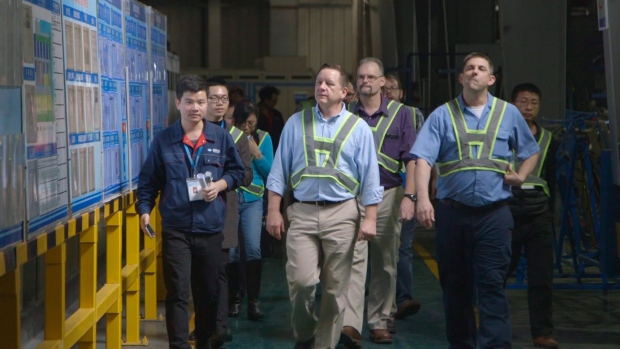Sep 2, 2019
Why China's buzzing about Netflix's documentary 'American Factory'
Bloomberg News

“American Factory,” a new Netflix Inc. documentary about a Chinese-owned factory in Ohio isn’t being screened in China. But hundreds of thousands of people have seen it anyway, sparking a debate that delves into the relationship between the world’s two largest economies.
The 115-minute film was widely discussed on Chinese social networks and spawned dozens of reviews by influential bloggers and state media, prompting discussions on globalization, cultural differences, automation and workers’ rights. Netflix isn’t available in China, and a company spokesperson said there’s no legitimate way to watch it there.
The documentary, backed by Barack and Michelle Obama’s new production company, follows along as a shuttered General Motors plant outside Dayton is bought and converted into a factory run by China’s Fuyao Glass. The complexities of the issue are evident in the reactions it evoked in China, a mix of self-reflection and defensiveness as the trade war with the U.S. shows no sign of ending.
The U.S. levied another round of higher tariffs on Chinese goods on Sept. 1, and China retaliated.
The film starts out on an optimistic note, but the clash of working cultures -- especially over the question of unionization -- soon engulfs the factory. In the end, the union effort fails, and its Chinese managers start replacing workers with machines.
The clash between the American workers and their new Chinese managers in the film may be rooted in the different business models both countries favor, a blogger named Liu Run wrote in a post on popular messaging platform WeChat that was viewed more than 40,000 times. Fuyao’s management came across as callous in the film because its success hinged on minimizing costs, rather than investing in innovation, he said.
“If U.S. manufacturing is high-end, then China’s manufacturing, overall, is still about medium and low-end assembling,” he wrote. Automation can’t be the solution, Liu added, asking “if the U.S. and Germany boost automation, why would anyone come from far away to invest in China?”

Culture Clash
In multiple posts and comments, Chinese internet users who’d seen the film on streaming sites and through using virtual private networks dissected the differences between the American workers and their Chinese colleagues.
In the film, the former complain about long working hours and express concern about safety risks and environmental protection -- prompting them to attempt to form a union. Meanwhile, the Chinese work longer hours, pay little attention to safety and offer little push-back against their bosses’ demands.
“When unionization efforts failed, the Chinese workers seem to be even happier than the managers, do they have Stockholm Syndrome?” Joe Zhou, who works in the media industry, said on WeChat. “The answer might be complicated.”
In China, every company has a so-called worker’s union. These organizations aren’t directly involved in negotiating salaries and benefits, and their main purview is planning team-building activities and distributing gifts on holidays. In Fuyao’s case, the union is run by its chairman’s brother-in-law, who describes the union and the company as “two gears rotating together.”
State Media
Government-owned media framed the documentary squarely within China’s protracted trade spat with America, using it to bolster arguments that the U.S. needs Chinese investment to generate jobs and that an economic decoupling is untenable.
State broadcaster CCTV published an article on its social media platforms pointing out the crucial role Ohio played in President Donald Trump’s 2016 election victory, and that Trump once promised to bring more jobs to the state.
“However, GM closed another big plant in the state earlier this year,” CCTV wrote. “More ironically, trade tensions have led to a sharp drop of Chinese investment to the U.S., making ‘American factories’ like Fuyao’s one of the few important lifelines in the region.”
The documentary is playing a “positive role” in helping the two peoples understand each other, Xinhua News Agency wrote in a commentary. The countries still lack mutual understanding, and compared with the rhetoric of “decoupling” and a “clash of civilizations,” a film focusing on cooperation and communication between the U.S. and China is “timely, realistic and meaningful,” it wrote.
Ultimately, some viewers went away more conflicted than before.
“The feeling is very complicated. I still appreciate how diligent and organized our Chinese workers are, but on the other hand, I also feel empathy for the American workers who are asking for more rights and protection,” said 33-year-old Zhang Ming, who streamed the movie on a Chinese website where it was viewed more than 700,000 times.
“I don’t see an answer to these questions,” said Zhang. “Maybe eventually everyone will be replaced by automation.”
--With assistance from James Mayger.





